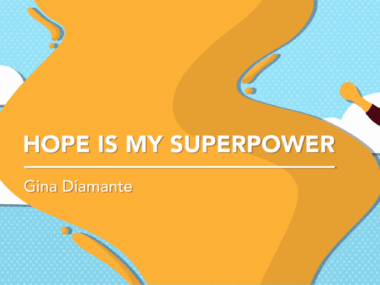The isolation and frustration that can come with a rare cancer
A surprising number of people don't understand the language of myeloma
Written by |

During my mom’s last support group meeting, the facilitator asked all the participants to introduce themselves and identify their cancer by name.
One after the other, the attendees mentioned their names and the cancer they were managing. There were many names, and I was struck by all the different types: lung, prostate, breast, cervical, pancreatic, and so many others that I didn’t know existed. In fact, it seemed as if there were a cancer for every part of the human body.
And then came our turn to introduce ourselves. After I said “multiple myeloma,” the hall fell silent. It was similar to the type of silence that occurred when my mother was diagnosed.
I could feel the eyes on me and my mum. Were they feeling pity for us? Or were they wondering, trying to make sense of what I’d just said?
Someone coughed. All eyes turned to the facilitator. “Myeloma?” he asked. “It’s blood-related. Like leukemia, right?”
Some people nodded as if he’d shed some light. I just sighed silently, not sure of what to say.
Actually, that’s the problem with rare cancers. Even when you’re in a hall surrounded by people with other forms of the disease, you still find yourself explaining your illness. You tell them the cancer’s causes, methods of diagnosis, symptoms, and treatments, even though these things can be revealed by a simple Google search.
The invisible divide
Myeloma seems to enjoy staying out of the limelight. It doesn’t have ribbons or walks or celebrity spokespeople. With myeloma, you’ll not find any sea of pink to swim inside. The isolation just keeps revealing itself in small ways, such as:
- The manner in which other caregivers nod with sympathy, despite their eyes seeming to say, “I don’t know what that is.”
- The well-meaning but useless advice. (“My aunty has breast cancer. Have you tried using turmeric for your mum’s condition?”)
- The blank stares when you mention her diagnosis at your school reunion.
When people mistakenly call it “melanoma,” you eventually stop correcting them. Why? Sometimes you feel too tired, weak, and frustrated to offer explanations or make corrections.
The double-edged sword of online communities
Last year, I joined an online myeloma forum. For the first time, I heard people speaking in our language. I felt at home, finally. Why? Because they were talking in lingo that I was used to, such as light chains, CAR T-cell therapy, daratumumab (sometimes known as Darzalex, its brand name), CRAB diagnostic criteria (hypercalcemia, renal insufficiency, anemia, and bone lesions), and so on.
However, there’s a dark side to this sort of forum:
- The algorithm begins to show you ads for funeral plans alongside updates on clinical trials.
- Comparison becomes compulsive. (Why is his mom responding to treatment and showing improvement while mine is not?)
- Hope feels fragile when you’re tracking the relapses experienced by others as if they were weather patterns.
- Sometimes solidarity causes us pain as much as silence.
How we’re carving out connection
Dark sides or not, I realize the value of connecting with others. Here’s how I do it.
- The radical act of explaining: On certain good days, I choose one person to teach about myeloma. I don’t do it out of pity. I do it just to be seen. I look at it as one of the repetitive routines of a caregiver.
- The unspoken club: There’s a way you lock eyes with another rare disease caregiver in the waiting room of a hospital. You don’t need to say anything. Words aren’t required.
- The “micro-allies”: They are plentiful. Like the neighbor who texts “Infusion today?” every Tuesday. Or the pharmacist who remembers my mother’s protocol. Or the cab driver who remembers to come around every last Friday of the month to take us for my mom’s monthly hospital visits.
To any caregiver feeling alone in this
Here’s what I’d remind caregivers of people with rare cancers:
You are not invisible. You are not overreacting. And you are not displaying selfishness because you wished (even if it’s just once in a while) that your loved one had a more common cancer.
This road is more silent than most. However, you’re still treading on it. And somewhere in front of you, there’s another caregiver who’s waiting to whisper to you, “Me too.”
Note: Rare Cancer News is strictly a news and information website about these diseases. It does not provide medical advice, diagnosis, or treatment. This content is not intended to be a substitute for professional medical advice, diagnosis, or treatment. Always seek the advice of your physician or other qualified health provider with any questions you may have regarding a medical condition. Never disregard professional medical advice or delay in seeking it because of something you have read on this website. The opinions expressed in this column are not those of Rare Cancer News or its parent company, Bionews, and are intended to spark discussion about issues pertaining to rare cancers.




Leave a comment
Fill in the required fields to post. Your email address will not be published.